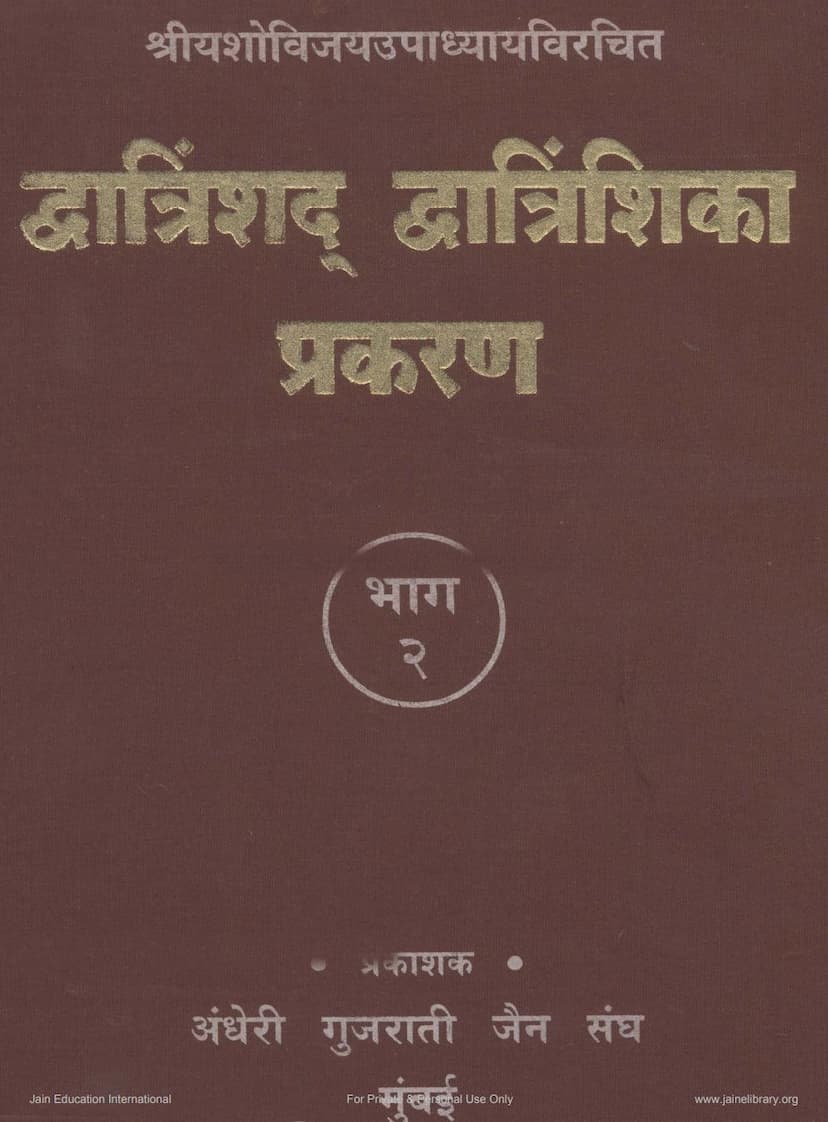Dwatrinshada Dwatrinshika Prakran Part 2
Added to library: September 1, 2025

Summary
Here's a comprehensive summary of the Jain text "Dwatrinshada Dwatrinshika Prakran Part 2," based on the provided pages:
Book Title: Dwatrinshada Dwatrinshika Prakran Part 2 Author(s): Yashovijay Upadhyay, Yashovijay of Jayaghoshsuri Publisher: Andheri Jain Sangh Catalog Link: https://jainqq.org/explore/004939/1
Overall Summary:
The provided text is the second part of a multi-volume commentary or exposition on the "Dwatrinshada Dwatrinshika Prakaran" (also known as "Batriś-Batriśī" or "Batriśī Prakaran" in Gujarati). This Mahagrantha, authored by the renowned Jain scholar Yashovijay Upadhyay, focuses primarily on Yoga and Spirituality. The commentary, titled "Nayalata Teeka" in Sanskrit and "Dwatrinshika Prakash" in Gujarati, has been compiled and presented in eight volumes by Muni Yashovijay, a disciple of Punyasagarvijayji. Part 2, which is being summarized, comprises chapters 5 through 8 of the original work.
The publication aims to make the profound spiritual and yogic teachings of Yashovijay Upadhyay accessible to a wider audience by providing clear and understandable explanations in both Sanskrit and Gujarati, along with a critical analysis and correction of earlier printed versions using manuscript comparisons.
Key Aspects and Content Breakdown:
- Author and Lineage: The work is a tribute to the vast scholarship and spiritual depth of Yashovijay Upadhyay, a prominent figure in Jain philosophy and logic. The commentary and publication are presented with the blessings of esteemed Acharyas and Gurus.
- The "Batriś-Batriśī" Structure: The original text, "Dwatrinshada Dwatrinshika Prakaran," is notable for its structure: it contains thirty-two chapters, and each chapter comprises thirty-two verses (Gathas). This unique format lends the text its name.
- Core Subject Matter: The primary focus of the "Dwatrinshada Dwatrinshika Prakaran" is Yoga and Spirituality. The commentary delves into these complex subjects using the precise and intricate terminology of Navya Nyaya (New Logic).
- Purpose of the Commentary: The publication highlights the long-felt need for a simple, clear, and understandable commentary on this profound text. The author, Muni Yashovijay, has undertaken this task to bridge the gap between the intricate language of the original work and the accessibility required for contemporary readers.
- Part 2 Chapters (5-8) Overview (based on page contents): The summary of the chapters provides a glimpse into the rich spiritual and ethical discussions within this volume:
- Chapter 5: Bhakti Dwātrinśikā (Devotion): This chapter deals with the profound nature of devotion towards the Jina Tirthankaras, exploring various forms of devotion, the construction and consecration of Jinalayas (temples), the creation of Jinabimbas (idols), and the underlying principles of worship. It emphasizes the importance of pure intention and the spiritual benefits derived from these acts.
- Chapter 6: Sādhu Sāmagrī Dwātrinśikā (Qualities of an Ascetic): This chapter focuses on the essential components of an ascetic's life and spiritual perfection. It discusses the three key pillars: knowledge (Jñāna), pure alms-gathering (Bhikṣā), and dispassion (Vairāgya). It elaborates on the types of knowledge, the principles of alms-gathering, and the different forms of dispassion.
- Chapter 7: Dharma Vyavasthā Dwātrinśikā (Order of Dharma/Principles of Righteousness): This chapter addresses crucial aspects of righteous conduct, particularly for ascetics. It discusses the discernment of what is permissible and impermissible to consume (Bhakṣyābhakṣya), places to visit (Gamyāgamya), the significance of specific austerities (Tapas), and the concept of compassion (Dayā). It also critically analyzes and refutes the views of other philosophies, such as Buddhism and the Dvija perspective, on issues like meat-eating and the definition of violence.
- Chapter 8: Vāda Dwātrinśikā (Disputation/Argumentation): This chapter shifts focus to the nature and importance of discourse and debate in the pursuit of truth. It categorizes different types of discourse (Śuṣka Vāda, Vivāda, Dharma Vāda) and outlines the qualities of participants and the appropriate conduct for such discussions. It emphasizes the role of Dharma Vāda in understanding and progressing on the spiritual path, while cautioning against empty debates.
- Commentaries and Editorship: The publication includes Muni Yashovijay's "Nayalata Teeka" (Sanskrit commentary) and "Dwatrinshika Prakash" (Gujarati commentary/explanation). The meticulous editorial work involved in correcting impurities and cross-referencing has been acknowledged.
- Previous Editions and Sources: The text mentions previous printed editions and acknowledges the use of seven handwritten manuscripts for the current edition, highlighting the effort to ensure accuracy and clarity.
- Inclusion of Vedic and Upanishadic Texts: An appendix (Page 29-32) lists a significant number of Vedic and Upanishadic texts referenced in the "Nayalata Teeka," indicating the author's extensive comparative study and integration of diverse philosophical and spiritual traditions.
Overall Significance:
This publication represents a significant contribution to Jain literature, making the complex philosophical and yogic teachings of Yashovijay Upadhyay accessible and understandable. The detailed commentary and scholarly approach by Muni Yashovijay ensure that the wisdom of this ancient text is preserved and conveyed effectively to modern readers. The inclusion of diverse philosophical references underscores the text's comprehensive nature.